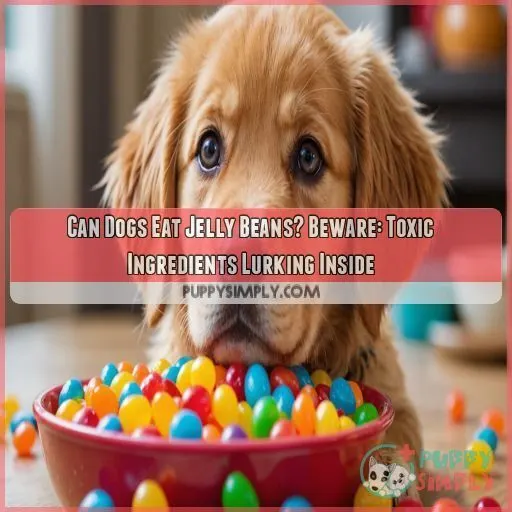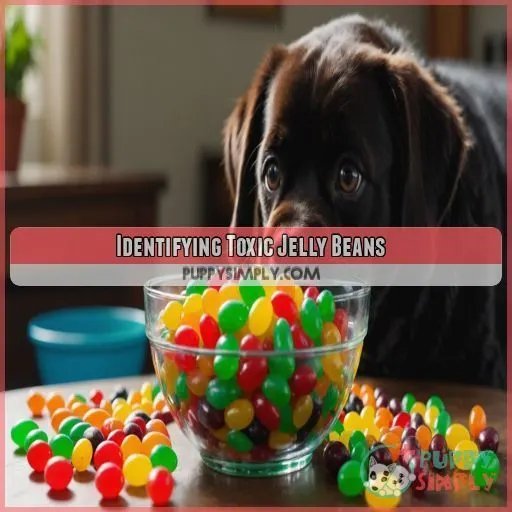This site is supported by our readers. We may earn a commission, at no cost to you, if you purchase through links.
 Uh-oh, did your furry friend snag a jelly bean?
Uh-oh, did your furry friend snag a jelly bean?
If you’re frantically searching "can dogs eat jelly beans," we’ve got the lowdown.
While it’s unlikely a single jelly bean will harm your pup, the ingredients inside can be toxic in large quantities.
Xylitol and caffeine are the culprits, causing liver failure, hypoglycemia, and even death in dogs.
Puppies and older dogs are more vulnerable, so it’s really important to keep these treats out of reach.
If your dog has gobbled up a jelly bean, stay calm and call your vet ASAP.
There’s more to this sticky situation – read on!
Table Of Contents
- Key Takeaways
- Can Dogs Eat Jelly Beans?
- Why Are Jelly Beans Bad for Dogs?
- What to Do if Your Dog Eats Jelly Beans
- Identifying Toxic Jelly Beans
- Creating a Safe Environment for Pets
- Preventing Jelly Bean Ingestion and Promoting Pet Safety
- Frequently Asked Questions (FAQs)
- Do Jelly Belly Jelly beans contain xylitol?
- Are Brach’s jelly beans toxic to dogs?
- Is it OK if my dog eats jelly?
- Can dogs have nerds jelly beans?
- How do I keep my dog calm after eating candy?
- Can my dog still exercise after ingesting jelly beans safely?
- How often should I check my dogs blood sugar levels?
- Will a small amount of jelly beans cause severe reactions?
- Are sugar-free candies less toxic to dogs than regular ones?
- Conclusion
Key Takeaways
- You’re a great pet parent for double-checking what human treats are safe for your furry friend – and when it comes to jelly beans, it’s best to keep them out of paw’s reach.
- Xylitol and caffeine in jelly beans can be toxic for your pup, so opt for xylitol-free, caffeine-free treats instead – and always check the ingredients list to ensure the treats you’re sharing are safe for your furry friend.
- Don’t panic if your dog eats a jelly bean (or two, or three) – accidents happen! Keep an eye out for symptoms like vomiting, diarrhea, loss of appetite, and lethargy. If you notice anything unusual, contact your vet ASAP.
- Remember, it’s always best to steer clear of jelly beans altogether, as even small amounts can cause mild digestive upset.
- If your dog does snag a jelly bean, stay calm and check the ingredients list for toxic substances like xylitol or caffeine. If you see either of these, contact your vet right away for guidance.
- Don’t think you’re off the hook if your dog only eats a small amount of jelly beans – even a small amount can be toxic, especially if it contains xylitol or caffeine.
- The ASPCA Poison Control Center is a great resource for guidance.
- Sugar-free candies aren’t a safer bet for your pup – they might contain xylitol, which can cause liver failure, hypoglycemia, and even death in dogs. Stick to dog treats that are specifically made for their taste buds.
- Pet-proofing your home and yard is key to avoiding sticky situations. Educate your family on pet safety, store toxic treats safely, and supervise your pets to ensure your furry friend stays safe and sound. Choose safe, pet-friendly alternatives instead.
Can Dogs Eat Jelly Beans?
You’re probably wondering if it’s safe to share those colorful jelly beans with your furry friend.
The answer is a resounding no – jelly beans aren’t a suitable snack for dogs.
While they may seem harmless, many jelly beans contain toxic ingredients like xylitol and caffeine that can cause serious harm to your dog.
It’s best to keep them out of reach.
Toxic Ingredients to Watch Out For
If you’re thinking about giving your pet jelly beans, watch out for toxic ingredients like artificial sweeteners, flavorings, and coloring agents. These can cause allergies or reactions, so always check the ingredients!
Xylitol and Caffeine Content
Xylitol and caffeine in jelly beans can be toxic for your pup. Steer clear of these dangerous ingredients – your dog’s safety is top priority! Opt for xylitol-free, caffeine-free treats instead.
Sugar Content and Digestive Issues
Sugar content in jelly beans can cause mild digestive upset in dogs, including vomiting and diarrhea. You should keep a close eye on your furry friend’s health if they’ve ingested these sweets.
Flavoring and Coloring Agents
When it comes to flavoring and coloring agents in jelly beans, you need to be aware of artificial food dyes, which can cause dog allergies and other issues.
Jelly Bean Brands to Avoid
When shopping for jelly beans, skip brands that contain toxic ingredients like xylitol.
Opt for pet-friendly alternatives instead.
Your furry friend will thank you for prioritizing their health and safety.
When looking for jelly bean brands to avoid, be on the lookout for those containing xylitol, caffeine, or other toxic ingredients.
Some popular brands to steer clear of include Jelly Belly, Haribo, and Sour Patch Kids.
Why Are Jelly Beans Bad for Dogs?
Your dog’s health is super important, and that means being careful about what they eat. You want to make sure their snacks are delicious and safe, right? Sometimes, even seemingly harmless treats like jelly beans can be dangerous for our furry friends.
Lack of Nutritional Value
Jelly beans offer no nutritional value for dogs, providing empty calories. They can’t replace a balanced diet and may even lead to digestive issues. Your furry friend deserves better, so choose healthy snacks and avoid candy altogether.
Harmful Ingredients and Allergic Reactions
You’re likely worried about the harm jelly beans can cause your furry friend. Here are 3 key culprits to watch out for:
Jelly beans contain artificial sweeteners, food sensitivities, and common allergens that can trigger allergic reactions in dogs. Here are three potential dangers to watch out for:
- Xylitol, a sugar substitute, can cause liver ing failure and hypoglycemia
- Caffeine can lead to hyperactivity, vomitingested, and even death
- Artificial flavors and colors can cause digestive issues and allergic reactions
Pre-existing Conditions and Vulnerability
If your furry friend has pre-existing conditions like diabetes or obesity, jelly beans are a recipe for disaster.
Their immune system may already be compromised, making it harder to fight off the negative effects of these sugary treats.
If your dog has pre-existing conditions like diabetes, obesity, or heart disease, they’re more vulnerable to jelly bean-related health issues.
Weakened immune systems can’t handle the sugar rush, so it’s crucial to prioritize veterinary care and blood tests to monitor their health.
Puppies and Older Dogs at Risk
You’re not alone in worrying about your furry friend‘s sweet tooth! Puppies and older dogs are more vulnerable to jelly bean dangers due to their sensitive digestion and health conditions. Here are some key concerns:
- Puppies’ developing digestive systems can’t handle the sugar and toxin overload.
- Senior dogs‘ declining health and reduced mobility make them more susceptible to choking hazards and digestive issues.
- Weakened immune systems in both puppies and older dogs increase the risk of severe reactions to toxic ingredients.
What to Do if Your Dog Eats Jelly Beans
If your dog has eaten jelly beans, you’re likely panicking, but knowing what to do can make all the difference. First, check the ingredients list for toxic substances like xylitol or caffeine, and if you see either of these, contact your vet right away for guidance.
Emergency Actions and Veterinary Insights
If your dog eats jelly beans, stay calm and contact your vet or the ASPCA Poison Control Center immediately. If xylitol is present, emergency vet visits may be necessary. Follow their advice on inducing vomiting or seeking pet first aid.
Monitoring for Symptoms and Signs of Illness
Now that you’ve taken emergency action, it’s time to monitor your dog’s health closely. Keep an eye out for these symptoms:
- Vomiting: A common reaction to jelly bean ingestion.
- Diarrhea: Another unfortunate consequence of eating jelly beans.
- Lethargy: If your dog becomes lethargic, seek veterinary help ASAP.
- Loss of Appetite: A decrease in appetite can indicate a more serious issue.
Inducing Vomiting and Treatment Options
If your dog eats jelly beans, don’t panic! Induce vomiting only if advised by a vet. Focus on home remedies, a bland diet, and plenty of love. Consult a vet for guidance. Monitor symptoms closely. Priority is your pet’s health.
| Symptoms | Treatment Options |
|---|---|
| Vomiting, diarrhea | Withhold food for 12 hours |
| Lethargy, seizures | Administer live yogurt and Pepcid |
| Weakness, tremors | Offer a bland diet of boiled |
| Hypoglycemia, coma | Seek immediate emergency care |
Preventative Measures and Pet Safety
Now that you know the risks, it’s time to pet-proof your home! Store jelly beans and toxic treats safely, supervise your furry friends, and educate your family on pet safety. Your pup’s health is worth it – stay vigilant!
Identifying Toxic Jelly Beans
You’re probably worried about your furry friend getting into those colorful jelly beans, and you’re right to be concerned – some jelly beans contain toxic ingredients like xylitol and caffeine that can harm your dog. Let’s help you figure out which jelly beans are safe and which ones to keep away from your pet.
Checking Ingredients Lists for Xylitol
When shopping for treats, become an expert label reader! Check for xylitol-free candy and opt for safe alternative treats. This sugar substitute is toxic to dogs, so it’s really important to avoid it. By reading ingredient labels carefully, you can keep your furry friend safe and sound. Choose pet-safe treats only!
Recognizing Caffeine Content and Other Toxins
When checking jelly bean ingredients, don’t just look for xylitol – also watch out for caffeine, a common toxin in candies. Even small amounts can cause vomiting, diarrhea, and tremors in dogs. Be proactive: read labels carefully, and if in doubt, choose pet-safe treats to keep your furry friend safe and happy.
Identifying Jelly Bean Brands With Toxic Ingredients
When shopping for jelly beans, check the ingredients list for xylitol levels. Some popular brands contain this toxic ingredient, while others offer xylitol-free options. Opt for safe alternatives, and remember, it’s always better to be safe than sorry when it comes to your furry friend’s treats and snacks.
Creating a Safe Environment for Pets
As you dog-proof your home and yard, remember that it’s not just about hiding the jelly beans – it’s about creating a safe haven for your furry friend to thrive. By being mindful of potential hazards and taking simple steps to prevent accidents, you can rest easy knowing your pup is safe and sound.
Pet-Proofing Your Home and Yard
Now that you know what toxic jelly beans to avoid, let’s pet-proof your home and yard. Secure those tempting treats, move hazardous items out of reach, and consider fencing off areas where your furry friend might get into trouble.
Identifying and Removing Toxic Plants
Now that you’ve pet-proofed your home, let’s tackle the great outdoors! Identify toxic plants in your yard using a plant identification app or consulting with a gardening expert, and remove them to create a safe haven for your furry friend.
Pet-Friendly Plant Alternatives and Safe Treats
- Sweet Potato Chews
- Green Bean Crunch
- Carrot and Apple Slices
- Peanut Butter Biscuits
These safe snacks will keep your furry friend happy and healthy.
Education and Awareness for Pet Owners
You’re your pet’s best advocate. Stay informed about toxic foods, safe treats, and pet safety tips. Join online dog owner groups for support and advice on pet training, behavior, and health concerns, ensuring your furry friend’s well-being and happiness.
Preventing Jelly Bean Ingestion and Promoting Pet Safety
You’re probably aware that jelly beans and dogs don’t mix, but it’s easy to let your guard down – especially during holidays or parties when these tiny treats are abundant. To keep your furry friend safe, it’s really important to take proactive steps to prevent jelly bean ingestion and promote overall pet safety in your home.
Storing Jelly Beans and Other Treats Safely
To keep your furry friend safe, store jelly beans and treats in airtight containers on high shelves. This simple trick keeps curious snouts out of trouble. Make it a habit to pet-proof your kitchen, just like you’d with toddlers!
Supervising Pets and Preventing Accidental Ingestion
Now that you’ve pet-proofed your home, it’s time to supervise your pets and prevent accidental ingestion. Here are some supervision tips to keep your furry friends safe:
- Keep an eye on your pets at all times
- Be aware of their surroundings and potential treats
- Watch for signs of interest in forbidden foods
- Keep them occupied with pet-friendly activities
- Reward good behavior with healthy treats
Educating Children and Other Family Members
To keep your furry friend safe, involve the whole family! Supervise kids and teach them about pet safety, candy dangers, and the importance of safe treats. Set clear rules and make pet-proofing a fun, family activity.
| Pet Safety Rules | Why They Matter |
|---|---|
| Supervise kids around pets | Prevent accidental ingestion |
| Keep candy out of reach | Avoid toxic treats |
| Choose safe treats | Make sure they get healthy snacks |
| Set clear family rules | Promote responsibility |
Building a Support Network for Pet Owners
Connect with fellow pet owners online, at pet-related events, or through local groups to build a support network. Share your pet stories, seek advice, and learn from others – it’s a great way to stay informed and keep your furry friends safe!
Frequently Asked Questions (FAQs)
Do Jelly Belly Jelly beans contain xylitol?
Don’t sweat it, pal! Jelly Belly Jelly beans don’t contain xylitol, so that’s a huge relief. However, it’s still important to keep them out of your furry friend’s paws due to their potentially upset-tummy-causing sugar content.
Are Brach’s jelly beans toxic to dogs?
You’re worried about Brach’s jelly beans and your furry friend? Good news: Brach’s jelly beans don’t contain xylitol, a common dog toxin. However, it’s still possible for dogs to experience mild stomach upset due to the high sugar content.
Is it OK if my dog eats jelly?
Hey there, dog parent! If your furry friend snags a jelly bean, don’t panic. While they’re not toxic, they can cause tummy troubles. Monitor for vomiting, diarrhea, and lethargy, and consult your vet if symptoms occur. A bland diet and some TLC should do the trick!
Can dogs have nerds jelly beans?
Hey there, dog parent! So, you’re wondering if your furry friend can have Nerds jelly beans? Unfortunately, it’s not a good idea to share them with your dog. Nerds contain xylitol, a sweetener toxic to dogs. Even if your dog doesn’t show symptoms immediately, it’s best to avoid giving them any candy. Instead, stick to dog-friendly treats and snacks!
How do I keep my dog calm after eating candy?
Ah, sweet tooth disaster! If your dog has eaten candy, stay calm and withhold food for 12 hours. Then, feed a bland diet for 3 days. Online vet advice is just a click away, and experts can offer quick fixes and reassuring words to calm your furry friend.
Can my dog still exercise after ingesting jelly beans safely?
After your dog eats jelly beans, keep an eye on how they’re acting and adjust their exercise routine accordingly. If they’ve a little tummy trouble, a short, gentle walk might be fine, but always talk to your vet for personalized advice to keep your furry friend safe and comfortable.
How often should I check my dogs blood sugar levels?
Did you know that 1 in 5 dogs will experience mild digestive upset after eating jelly beans? If your furry friend has ingested these treats, monitor their blood sugar levels regularly, especially if they’re prone to hypoglycemia. Consult with your vet for personalized guidance.
Will a small amount of jelly beans cause severe reactions?
So, you’re worried about a small amount of jelly beans causing severe reactions? Relax, but don’t freak out! While they’re not toxic, a small amount might still cause mild digestive upset. Keep an eye on your pup and if symptoms occur, follow the advice in the linked article.
Are sugar-free candies less toxic to dogs than regular ones?
The age-old question: can dogs chow down on sugar-free jelly beans? The answer is a resounding "no way, José!" Sugar-free candies may seem like a safer bet, but remember, for your pup’s sake, it’s always best to stick to dog treats that are specifically made for their taste buds.
Conclusion
You’re about to snack on jelly beans when your furry friend beats you to it! You frantically search "can dogs eat jelly beans" and remember: while a single bean is unlikely to harm, toxic ingredients like xylitol and caffeine can be deadly.
Stay vigilant, keep those treats out of reach, and if disaster strikes, call your vet ASAP. Keep asking "can dogs eat jelly beans" and prioritize pet safety – your pup’s life depends on it.
As you’re reading this, you’re probably thinking, "I’ll just keep a close eye on my furry friend and avoid any sticky situations." And that’s exactly what you should do! Remember, it’s always better to be safe than sorry when it comes to your pup’s health.











